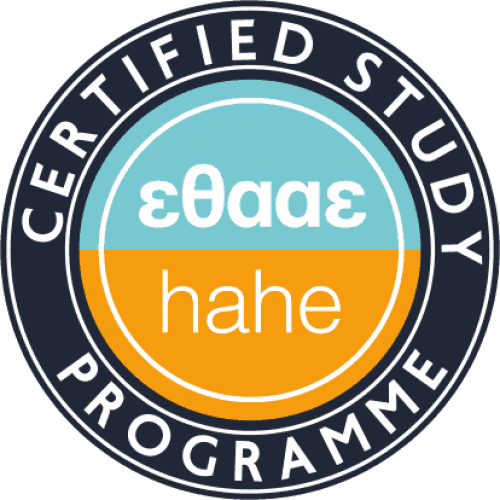Undergraduate Studies

Undergraduate studies
The Undergraduate Studies Curriculum of the Department of Psychology has been in operation since the academic year 2019-2020, according to the Law 4559/2018 regarding the establishment of the Department of Psychology at the University of Ioannina.
The minimum compulsory period of study at the Department is eight (8) semesters. The educational work of each academic year is structured in two semesters: the winter and spring semesters. Each semester comprises a minimum of thirteen (13) full weeks of instruction and at least two (2) weeks of examinations. Consequently, the Curriculum includes a total of four (4) winter semesters (1st, 3rd, 5th, and 7th) and four (4) spring semesters (2nd, 4th, 6th, and 8th). Each semester, a certain number of courses are offered: compulsory courses (CC) and compulsory elective courses (CEC) falling into the field of psychology by the Department of Psychology and other departments of the University of Ioannina, while optional courses (OC) of various disciplines are only offered by other departments of the University.
The Curriculum of the Department of Psychology is in accordance with the European Credit Transfer and Accumulation System (ECTS), as well as with the relevant Greek legislative framework (Law 3374/2005, Y.A. F5/72535/B3-2006, FEK 1091/10/08/06, vol.B΄, Y.A. F5/89656/B3, FEK 1466/2007, vol.B΄). The credit units (ECTS) corresponding to each course indicate the workload required for the successful completion of the specific course, through attendance of lectures, preparation of assignments as well as participation in laboratory exercises, seminars, and examinations.
According to the existing legislation framework (Y.A. Φ5/89656/B3, FEK 1466/2007), thirty (30) ECTS credits are required by each student of the Department of Psychology in each semester of studies. Each course of the Department of Psychology is assigned three (3) teaching units, which are proportional to the weekly teaching hours of the course in each semester. Both the teaching units and the ECTS credits corresponding to each course are awarded to students after they have succeeded in the final examination. In order to successfully complete the studies and obtain the degree of the Department of Psychology, students are required to accumulate at least two hundred and forty (240) ECTS credits, as well as to complete a Practicum in institutions of applied psychology.
As a result of the above, the Curriculum of the Department of Psychology can be compared with those of European Universities and thus provide the possibility of exchanges of scientific staff and students. Finally, according to the National Qualification Framework, the level of the degree (Bachelor’s Degree in Psychology) is set at level 6 (equivalent to the Bachelor’s Degree).
Description of the Undergraduate Studies Curriculum
The Undergraduate Studies Curriculum of the Department of Psychology includes, on the one hand, the “compulsory courses” (CC), which are attended by all students from the first to the sixth semester, and on the other hand, the “compulsory elective courses” (CEC) offered from the third to the eighth semester. As far as the CECs are concerned, the Curriculum gives students the opportunity to get further specialisation in psychology disciplines. In addition, the Undergraduate Studies Curriculum of the Department of Psychology includes “optional” courses (OC) from other departments of the University of Ioannina.
The distribution of ECTS credits among the courses and the Practicum is as follows:
Α. Compulsory Courses (Psychology) within the Department of Psychology
➢ 90 ECTS credits from 18 Compulsory Courses (Psychology) within the Department of Psychology
Β. Compulsory Elective Courses (Psychology) within the Department of Psychology and from other Departments of the University of Ioannina
➢ 108 ECTS credits coming from Compulsory Elective Courses (Psychology) of:
– the Department of Psychology
– the Department of Speech and Language Therapy
– the Department of Early Childhood Education
– the Department of Early Childhood Education & Care
– the Department of Philology
C. Optional Courses from other Departments of the University of Ioannina
➢ 20 ECTS credits from free-choice courses of
– the Department of Medicine
– the Department of Speech and Language Therapy
– the Department of Primary Education
– the Department of Early Childhood Education
– the Department of History and Archaeology
– the Department of Philosophy
D. Foreign Language Courses
➢ 10 ECTS credits from 2 Foreign Language Courses (English, French or German)
Ε. Practicum Placement
➢ 12 ECTS credits resulting from the attendance of the Practicum Seminar and the Practicum as such.
The curriculum was based on two important structural criteria: a) the inclusion of compulsory core courses concerning basic areas of psychology, such as Social, Cognitive, Educational, Clinical, Developmental Psychology and Neurosciences, and b) the ratio between compulsory and elective courses for the award of a degree and a professional license.
Learning outcomes
Upon completion of the Undergraduate Studies Curriculum of the Department of Psychology, graduates are expected to:
a) have acquired a strong cognitive background as well as sound knowledge in specific fields of the science of psychology
b) have been given the opportunity to specialise in key areas of psychology, such as Developmental, Cognitive, Educational, Social and Clinical Psychology
(c) have acquired professional and personal development skills, and be able to apply psychological methods to deal with real-life problems
(d) have been trained in research and data analysis methods used in psychology
(e) have developed those knowledge acquisition skills which are necessary for them to pursue their studies with a high degree of autonomy.
Tutorials
In the first year of studies and as part of the course “Research Methodology in Psychology: Quantitative Methods”, tutorials are conducted in accordance with the American Psychological Association (APA) guidelines. These tutorials, which focus on Literature Search in Electronic Databases as well as on Scientific Paper Writing, aim to enable students to:
a) become familiar with the search for scientific literature in various disciplines of psychology
b) be informed about the appropriate information search tools (databases, library catalogues, digital repositories, books, scientific journals, newspapers, conference proceedings, audiovisual material, theses, etc.)
c) get in touch with the international and Greek scientific literature as well as the bibliographic citation standards as defined by the APA
d) become familiar with the ways of writing and presenting scientific papers according to the APA guidelines.

